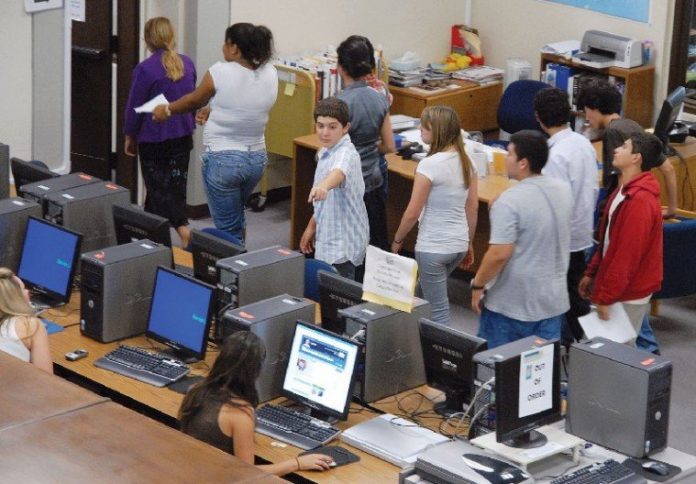They can’t vote. They can’t go alone to an R-rated movie. They
can’t even get a driver’s license. Yet these 62 high school
freshmen are doing something their peers aren’t: Going to
college.
Gilroy – They can’t vote. They can’t go alone to an R-rated movie. They can’t even get a driver’s license. Yet these 62 high school freshmen are doing something their peers aren’t: Going to college.
But none of these things they can’t do have kept 62 high school freshmen from being college students.
The students are part of the inaugural class at Dr. T.J. Owens Gilroy Early College Academy, which opened its doors Aug. 23. The Gilroy Unified School District-administered program combines college and high school classes on the Gavilan College campus. After three weeks of school, students, teachers and administrators said spirits are high and the program fits the needs of the students.
“I feel we have a lot more freedom because we’re treated like adults and we’re expected to act like adults,” 14-year-old Raelene Mendolla said.
Students said they chose the academy over Gilroy High School because it offered increased access to smaller classes, like-minded peers and college classes. The typical student takes three college classes in addition to five high school classes. The college credits accrued during high school will allow students to enter universities as juniors when they graduate from high school.
Physics, health, computer science and physical education are the most popular college classes, students said. In future semesters, students will be expected to take more college classes, principal Michael Hall said.
“We want to get their feet wet,” he said. “We start them out with classes that we feel they need but aren’t going to overwhelm them.”
Students, who said they welcome academic challenges, acknowledge that classes have been relaxed so far. Because Gavilan started after Labor Day, students have only taken college classes a little more than a week.
“It’s not like you stay up all night drinking energy drinks just to get your homework done,” 14-year-old Kristian Wallace said.
Still, classes can be difficult, which is what students want, Mendolla said.
“I think our peers are more focused on school than the normal teenager,” she said.
Teachers agree with Mendolla’s assessment, adding that the academy is what these students need to succeed. As they might not have the necessary support at home because their parents are not fluent in English or they did not get the individualized attention they needed when they were in large classes, they performed less than they were capable, Hall said. The academy and its teachers gives them the rigorous, individualized attention that can help them succeed, he said.
In turn, the teachers benefit from an attentive student body, global studies teacher Sam Navarez said.
“I’m spoiled,” he said. “You’ve got kids that want to learn. You have an environment that’s conducive to pushing them to a higher level. You’ve got an administration that’s supportive. And you’ve got the resources needed for students to be able to learn at a higher level.”
District trustees worried that the school, which does not offer extracurricular activities such as sports teams, would deprive students of social interaction. However, more than half the students interviewed said they still participate in social, extracurricular activities not associated with school. They also socialize with fellow students.
“We feel like a family,” Mendolla said. “There’s no enemies between us.”
The academy’s family is diverse. The school is balanced along gender lines and 74 percent of the students belong to minority ethnic groups. The school’s proportions of minorities to whites were higher than citywide proportions. Thirty-five percent of students are also the first in their family to attend college. The percentage of students who would be the first in their immediate family to complete college will be even higher, Hall said.
While academy staff and students are certain about the program’s success, some college staff still have reservations. Gavilan physics instructor Russell Lee said he noticed a difference between high school and college student behavior and comments. However, he purposely did not look at student ages so he would not be biased.
“Age of the student is not important to me, it’s their performance in the class and their willingness to be creative thinkers,” he said.
With the first class assignment due Friday, Lee will reserve judgments.
“I don’t have enough information yet to assess,” he said.














